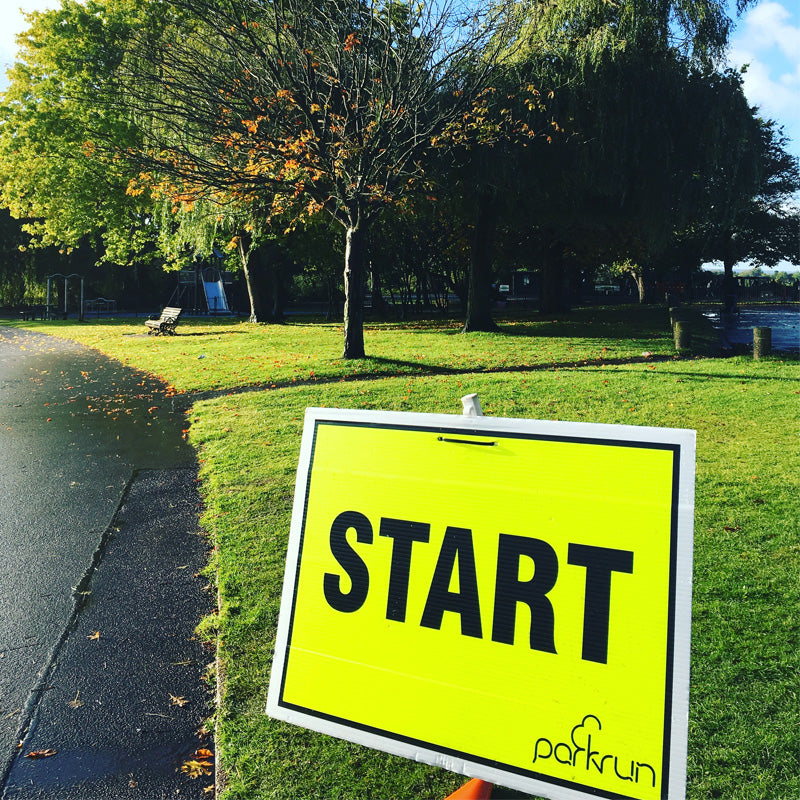How To Run a Faster Parkrun or 5k
Parkruns and Junior parkruns are back! Parkrun is enjoyed all over the world and allows millions of people to enjoy a free, timed run on a weekly basis. The great thing about Parkrun in particular is its inclusivity - everybody is welcome! People turn up at 9:00am on a Saturday (9:30am in Scotland) to achieve their own aims. Whether this is to simply complete the distance, meet up with friends or get a PB - it's all the same at parkrun!
If you've already been to a few parkruns though and are pondering ways in which you could improve your time, read on...
1. Set yourself a goal
It helps to have something to aim for that will really push you. Something just on the realms of possibility that you would be over the moon to achieve in, perhaps, 1 month, 6 months or even 12 months. Running 28 minutes at the moment with not too much training? Ok, your aim is now 25 minutes - you can do it!
2. Set yourself a series of realistic time improvements
Now you're not going to magically jump from 28 minutes to 25 (not without working hard) and it's going to be a series of incremental improvements, rather than a sudden huge PB. Even if you go faster by 10 seconds each week, that's going to be a minute dropped every 6 weeks.
3. Run more
If you want to run faster at a distance of 5k then a mixture of speed work and longer distance is required. You need to get a good ‘base’ of running down as this gets your body used to running – your muscles will get more efficient, your heart will get better at pumping blood around your body, the ligaments, tendons and muscles will get stronger and YOU will feel more confident and more like a ‘runner’. Increase the number of miles you run per week by 10% a week. So if you run 15 miles a week, up that to 16.5 and so on. Again, gradual progression is key to avoid injury or illness. Mo Farah runs 100 miles a week, but there’s no need to go that far!
4. Run faster
If you want to run faster - run faster! You need to teach your body to run at the pace required to hit your target time. This can be done through speed sessions comprising 5k broken down in the shorter, faster segments. This could be 5x1km with 3 minutes rest between, or 12x400m (killer sesh!).
"Fartleks" are a little more informal and a great way to easily introduce a little speed to your regular run. Swedish for 'speed play', Fartleks are mean throwing faster sections into your normal run. So, jog at normal pace for a mile or so to warm up, then sprint to the 3rd lamp post on the left, then jog for a minute... then TO THE POST BOX ON THE RIGHT - GO!, then jog... etc.
The Run Britain website has some good schedules and guides on this, for example this is their guide to running a sub 18 5k.
5. Try hill repeats
Resistance training such a hill repeats are often touted as the best way to improve your running as they work everything hard!
“Training on hills improves leg-muscle strength, quickens your stride, expands stride length, develops your cardiovascular system, enhances your running economy and can even protect your leg muscles against soreness. In short, hill running will make you a stronger, faster and healthier runner”
Running hills also forces you to adapt good running form, lifting your knees higher and driving with your arms.
6. Warm up before
It's so tempting on a cold winters's day to sit in the car with the heaters on, before reluctantly going to the start line at the last minute. But they say the shorter the run, the longer the warm up needed.
Warming up your body with a easy jog, dynamic stretching and some little sprints will get your heart pumping, your muscles warmed up and have you raring to go at the start line - rather than yawning.
7. Nutrition
Nutrition has more of an effect for longer runs (over 60 minutes) than shorter distances like 5k however, what you eat before-hand can make a difference. Try to eat a light breakfast, just enough to keep hunger at bay - save your proper brekkie for afterwards. You'll really notice a full stomach when trying to go at 5k pace, especially if you're pushing for a PB.
Also, ditch the water bottle - you don't need it for 5k and it's just extra weight to carry.
8. Know your field
When you start running the same parkrun every week you’ll begin to recognise the people around you. Speak to them, make friends with them and then remember who they are while you’re running. I use a Garmin but I only glance at it a couple of times during the run. I know exactly who I should be in front of and who to chase. I know that if I come in just after that person, then it’s going to be a good time, but if that person overtakes me then not so much. I find this a lot easier than concentrating on minutes per km and stats.
9. Try the parkrun pacer events
Some parkruns do pacer events, with volunteers running at a set pace to help you achieve your chosen time. Try and make one of these events as it can really help - you can switch off and just follow the pacer.
10. Smile
The great thing about parkrun, is that it’s held every week so if you don’t do as well as you’d hoped this week then never mind, just come back next week! There’s evidence to suggest that those who enjoy their running, do better. Look at Haile Gebrselassie – always smiling!
P.S, volunteer. It's great fun and parkrun couldn't survive without the army of people that give up their time on a Saturday morning.
P.P.S, Junior parkruns are also amazing!
11. BONUS TIP
Having the right gear can also benefit your time, allowing you to focus on the road ahead. If you suffer from chafing we have the solution! Check-out our range of the best running underwear, bras and socks - all guaranteed to be 100% chafe-free.
Next Steps...
Do you like the sound of parkrun? Here's what to do:
- Register for parkrun
- Find your local parkrun event
- Getting running
Keep Reading
More Running Advice from the experts at Runderwear:
- How To Stop Chafing When Running
- The 10 Flattest Marathons in the UK
- 10 Tips for Running in the Heat
Alternatively view the full list of Runderwear running advice articles.




Leave a comment
All comments are moderated before being published.
This site is protected by hCaptcha and the hCaptcha Privacy Policy and Terms of Service apply.